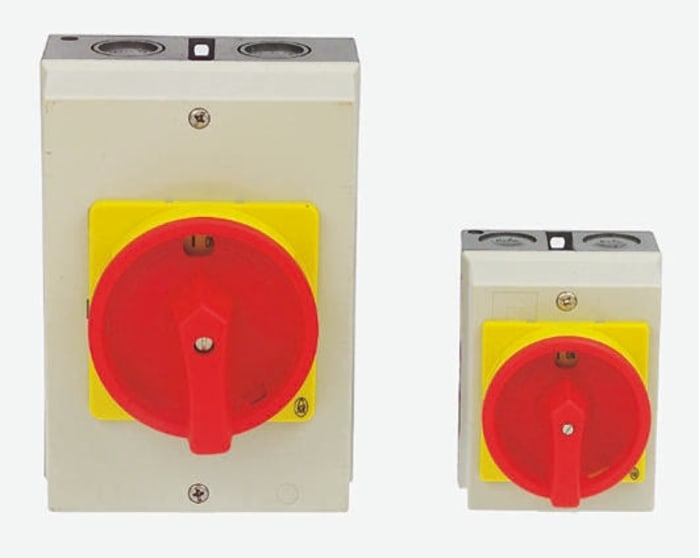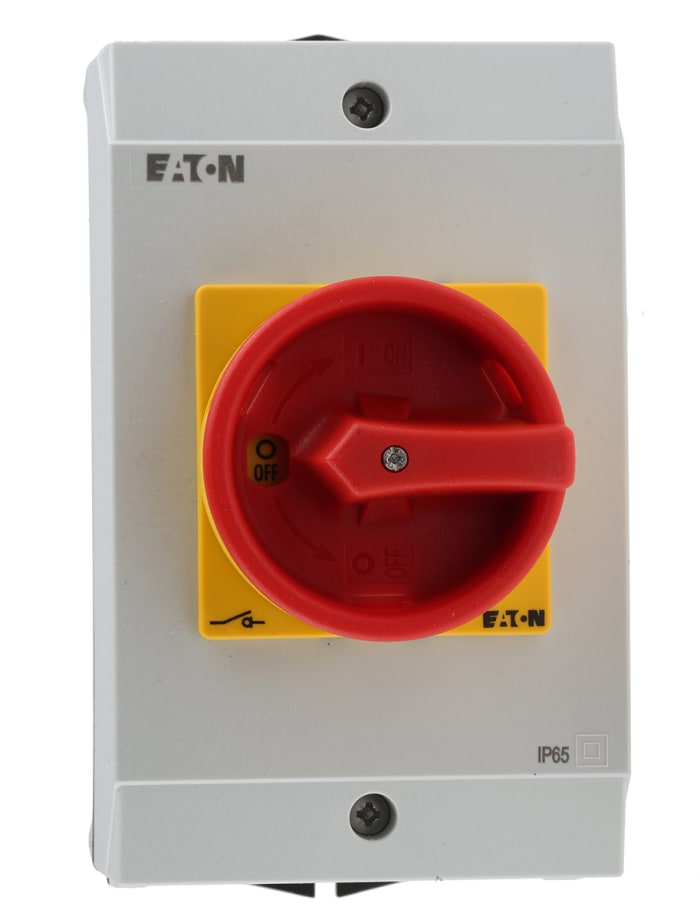Technical Document
Specifications
Brand
EatonNumber of Poles
6P
Maximum Current
20A
Mounting Type
Surface Mount
IP Rating
IP65
Power Rating
13kW
Voltage Rating
400V ac
Electrical Phase
3
Accepts Padlocks
Yes
Handle Colour
Red
Auxiliary Contacts Available
Yes
Normal State Configuration
NO/NC
Model Number
T0-4-15682/I1H/SVB
Enclosed/Not Enclosed
Enclosed
Switch Rating
20A
Length
150mm
Width
84mm
Depth
150mm
Terminal Type
Screw
Minimum Operating Temperature
-25°C
Maximum Operating Temperature
+40°C
Country of Origin
United Kingdom
Product details
Eaton Enclosed Isolator Switch
Eaton's isolator switch can sometimes be referred to as a switch disconnector, this is because it has been created and designed to safely isolate a circuit whilst it is being used or maintained. This isolator switch breaks or isolates a circuit through the rotation of the rotary handle and locking ring. This type of non-fused isolator switch will be found isolating circuit breakers, transmission lines, transformers and a multitude of other applications.
Features & Benefits
• The perfect solution for installing as a safety measure
• Used as an emergency switching off/emergency stop device
• The basic functions: used as a main switch, maintenance switch or manual override switch
• Thermoplastic, high impact surface mounting enclosure with an IP65 rating - this means that the enclosure part of the isolator has ingress protection against dust and is also protected against low-pressure jets of water that comes from all directions
• Built-in earth commoning block
• Lockable in the 0/OFF position, with up to three padlocks
• Totally insulated
• Red rotary handle and yellow locking ring, providing an aesthetically pleasing finish
What is the difference between a fused switch disconnector and a non-fused switch disconnector?
Unlike fused switch disconnectors, a non-fuse isolator switch does not use a fuse to break or put a circuit into isolation, they instead use a rotary to disconnect or isolate a circuit.


Stock information temporarily unavailable.
Please check again later.
AED 339.45
1 Box of 1 (ex VAT)
AED 356.42
1 Box of 1 (inc. VAT)
1
AED 339.45
1 Box of 1 (ex VAT)
AED 356.42
1 Box of 1 (inc. VAT)
1


Technical Document
Specifications
Brand
EatonNumber of Poles
6P
Maximum Current
20A
Mounting Type
Surface Mount
IP Rating
IP65
Power Rating
13kW
Voltage Rating
400V ac
Electrical Phase
3
Accepts Padlocks
Yes
Handle Colour
Red
Auxiliary Contacts Available
Yes
Normal State Configuration
NO/NC
Model Number
T0-4-15682/I1H/SVB
Enclosed/Not Enclosed
Enclosed
Switch Rating
20A
Length
150mm
Width
84mm
Depth
150mm
Terminal Type
Screw
Minimum Operating Temperature
-25°C
Maximum Operating Temperature
+40°C
Country of Origin
United Kingdom
Product details
Eaton Enclosed Isolator Switch
Eaton's isolator switch can sometimes be referred to as a switch disconnector, this is because it has been created and designed to safely isolate a circuit whilst it is being used or maintained. This isolator switch breaks or isolates a circuit through the rotation of the rotary handle and locking ring. This type of non-fused isolator switch will be found isolating circuit breakers, transmission lines, transformers and a multitude of other applications.
Features & Benefits
• The perfect solution for installing as a safety measure
• Used as an emergency switching off/emergency stop device
• The basic functions: used as a main switch, maintenance switch or manual override switch
• Thermoplastic, high impact surface mounting enclosure with an IP65 rating - this means that the enclosure part of the isolator has ingress protection against dust and is also protected against low-pressure jets of water that comes from all directions
• Built-in earth commoning block
• Lockable in the 0/OFF position, with up to three padlocks
• Totally insulated
• Red rotary handle and yellow locking ring, providing an aesthetically pleasing finish
What is the difference between a fused switch disconnector and a non-fused switch disconnector?
Unlike fused switch disconnectors, a non-fuse isolator switch does not use a fuse to break or put a circuit into isolation, they instead use a rotary to disconnect or isolate a circuit.



